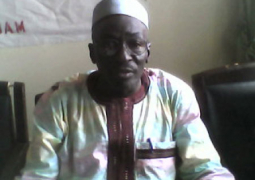
The convergence brought together local stakeholders from various fishing landing sites and committees to witness the occasion, with support from the European Union (EU) and United Nations Development Programme (UNDP) through a project called ‘Governance West African Marine Eco-Region’ being implemented by World Wide Fund for Nature (WWF).
Presiding over the official launching of the platform, Dr. Banja spoke at length on the importance of having such a national platform.
This would promote the governance management to galvanize efforts to reduce poverty, while applying sustainable measures for socio-economic development of the West Africa Marine Eco-Region (WAMER) member countries, he said.
According to him, the Go-WAMER project began implementation in six of the seven countries of the WAMER eco-region namely, Mauritania, Senegal, The Gambia, Guinea, Guinea Bissau and Cape Verde.
The main objectives of the project include to contribute to poverty reduction and strengthen food security in the coastal communities of West Africa Marine Eco-Region (WAMER) through the improvement of governance; and promotion of the adoption of best practices in terms of sustainable utilization of marine and coastal resources in the eco-region.
Therefore, he added, the main objective of Go-WAMER is in agreement with the government’s policy objectives for ensuring the long-term rational utilization of fisheries resources.
The fisheries sector contributes significantly to the social, cultural and economic well-being of coastal estuary and fresh water fishing communities in The Gambia, he noted.
The fisheries sector contributes significantly to country’s Gross Domestic Product (GDP), thus fish form a significant portion of the animal protein, he said.
However, he continued, these benefits are presently threatened as a result of the impact of climate change, poor and inadequate management practices, the use of inappropriate fishing techniques, as well as the ever increasing challenges of illegal, unreported and unregulated IUU fishing.
Dr Banja stressed that to overcome this challengers requires joint efforts from government institutions, the community and civil society organizations, NGOs and other development partners working together to enhance general sharing and flow of information on IUU and other illegal fishing applications.
The launching of the national platform for sustainable fisheries of the Gambia is timely, appropriate and in the right direction, particularly when the government is working with stakeholders and development partners to improve the conservation and management of fisheries resources, Dr Banja said.
“As the ministry responsible for the management and development of fisheries in The Gambia, I urge the national platform for sustainable fisheries to work with all partners to bring about sustainable success in the conservation and management of fisheries, including other natural resources,” he added.
Alagie Manjang, WWF-Country coordinator, hailed WWF-VAMPO for initiating such a platform, thanks to the EU and UNDP supported project, which has a sub-regional dimension and is being implemented in six fisheries member countries namely, Mauritania, Senegal, The Gambia, Guinea, Guinea Bissau and Cape Verde.
He said the Go-WAMER project aims to strengthen governance, policy management of marine and coastal resources, poverty reduction and food security in six of the seven-member fisheries commission.
“The principal objective is to improve governance and promote adoption of best practices for sustainable use of marine and coastal resources in WAMER, thus contribute to poverty reduction and realization of food security,” he added.
The livelihoods of these communities are directly dependent on these resources within the marine and coastal plateau, he said.
“The resources for which they depend on are continuously exploited, that is why we are making efforts to try to balance that relationship between nature and human,” Mr Manjang added.
The office in The Gambia works with the line ministries to galvanize efforts to sustainably manage the natural resources, he said, noting that the creation of National Platform for Fisheries is quite fitting, because it enables them to act and work with the members of the alliance to ensure these resources are sustainably managed.
Famara Darboe, director of fisheries, said sustainable fisheries - the reason for which the platform is been launched - is one of the key objectives of the Fisheries department, and to achieve this all actors must be involved to further the vision of the department.
Sustainability of the fisheries sector is important for both present and future generations to come, he added.
Mr Darboe urged the member organizations to the platform to ensure that the platform remains viable in their crusade to sustainably manage the platform.
Darrell Sexton, European Union focal point for Go-WAMER, said the EU in the past years provided support to the sub-region marine area for the good management of natural resources, while expressing his happiness to be associated with the event.



